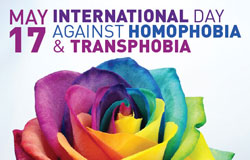|

|
 |
|
Last Updated: Feb 13, 2017 - 1:45:37 AM |
 LGBT health sees progress and challenges 15 years after homosexuality ceased being considered a disease
LGBT health sees progress and challenges 15 years after homosexuality ceased being considered a disease
Homosexuality has been recognized as a natural variant of human sexuality, and “therapies” to change sexual orientation have been rejected. However, stigma and discrimination persist in health services.
Washington, DC — Fifteen years after the World Health Organization (WHO) removed homosexuality from its list of mental disorders, there has been progress in the circumstances affecting lesbian, gay, bisexual, and transgender (LGBT) people. However, challenges persist, say experts at the Pan American Health Organization (PAHO).
In the lead-up to the International Day Against Homophobia and Transphobia—observed each year on 17 May to mark the day in 1990 when WHO removed homosexuality from the International Classification of Diseases (ICD) — experts at the Pan American Health Organization (PAHO) say there is now a widespread consensus that homosexuality is a natural variant of human sexuality and cannot be considered a pathological condition.
Among other advances, they note the rejection of “conversion therapies” aimed at changing sexual orientation, which lack medical and scientific justification and represent a serious threat to the health and well-being of people subjected to them, according to a technical document published by PAHO/WHO in 2012. There is also an emerging consensus today that transgender identity, like homosexuality, does not qualify as a disorder.
Another advance during the last 15 years was a resolution approved in September 2013 by the ministers of health of the Americas, meeting at PAHO, calling for reducing disparities in access to and use of health services by the LGBT population.
“The resolution recognizes that stigma and discrimination have real and adverse effects on LGBT people, generating barriers that range from outright denial of care to deficient care and erroneous assumptions about the causes of the health problems of LGBT individuals,” said PAHO Director Carissa F. Etienne.
Senior health officials from throughout the Americas committed themselves to working to eradicate stigma and discrimination in health services and to address other challenges, particularly the lack of information on the health of the LGBT population. PAHO/WHO is supporting efforts to collect information about the health needs of this population, the obstacles that its members confront in obtaining access to care, and the impact of stigmatization on LGBT people’s health and well-being.
“Few health information systems take account of variables such as sexual orientation or gender identity, and this means LGBT people are often invisible in health systems, with serious consequences for individual and public health,” Etienne said. The information being collected will help health systems redefine their care models with an approach that protects human rights and gender equality.
Available information indicates that LGBT people experience greater health disparities and worse outcomes than heterosexuals. They have higher rates of HIV infection, depression, anxiety, tobacco use, alcohol abuse, suicide and suicidal ideas as a result of chronic stress, social isolation, and lack of connection with various health and support services.
Another challenge is health professionals’ lack of skills to understand and address the specific problems of this group. “Lesbians, gays, bisexuals, and transgender individuals are recognized by the law and must receive respectful and considerate treatment by health services, in accordance with universal and regional human rights regulations and standards,” said Heidi Jiménez, PAHO/WHO Legal Counsel.
Currently, a number of countries in the Americas are carrying out health system reforms, discussing, reviewing, and formulating policies and human rights based legislation, and creating specific services for the LGBT population in order to progress toward universal access to health and universal health coverage.
“There has been progress, but we must do more to overcome the obstacle of homophobia and to provide equitable, comprehensive, differentiated, and friendly care to all persons, regardless of their sexual orientation,” said Anna Coates, heads of PAHO/WHO’s Gender and Cultural Diversity Unit.

© Copyright 2015 by thebahamasweekly.com
Top of Page
|
|
 |

|
